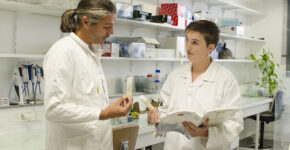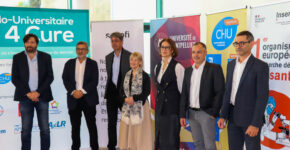Pôles de recherche
De l’exploration spatiale à la robotique en passant par l’ingénierie écologique ou les maladies chroniques, les chercheurs de l’UM inventent des solutions pour demain, au service de l’Homme et de son environnement.
Une recherche dynamique, menée en étroite collaboration avec les organismes de recherche et bénéficiant de plateformes technologiques de haut niveau pour répondre aux besoins de la société du XXIème siècle.
Une recherche de pointe, que l’UM s’attache à valoriser en tissant des liens étroits avec les industries implantées dans la région, notamment dans le secteur biomédical et des nouvelles technologies.
Agriculture, Environnement, Biodiversité (AEB)
Directeur : Daniel Barthélémy
Ce pôle regroupe plus de 3000 agents permanents de plusieurs organismes de recherche comme le BRGM, le Cirad, le CNRS, l’IFREMER, INRAE, l’IRD, ou d’enseignement supérieur comme l’Université de Montpellier, l’Institut Agro / Montpellier SupAgro et le CIHEAM-IAMM.
Biologie-Santé (BS)
Directeur : Pierre-Emmanuel Milhiet
La recherche est organisée autour de sept axes thématiques principaux, que sont : la Biologie quantitative, la Cancérologie, la Génétique-Epigénétique, l’Infectiologie & Immunologie, la Médecine Expérimentale & Régénératrice, les Neurosciences et Technologies pour la santé-Bioingénierie.
Chimie
Directrice : Joulia Larionova
Le Pôle de Recherche Chimie est un de cinq Pôles de Recherche de l’Université de Montpellier qui a été créé lors de la structuration de l’Université en devenant un établissement public expérimental (EPE) le 1er janvier 2022. Il fait partie des plus grands centres en France travaillant dans le domaine de la chimie et ses interfaces.
Le Pôle de Recherche Chimie constitue un espace d’animation scientifique, de mise en synergie des structures et des acteurs de la recherche, ainsi qu’un espace de concentration scientifique en vue du développement d’actions communes entre l’Université et ses partenaires.
Mathématiques, Informatique, Physique, Systèmes (MIPS)
Directeur : Stéphane Pagano
Il a pour objet de constituer un lieu de mise en synergie des structures de recherche et de concertation scientifique en vue de développer des actions communes entre les membres de l’I-SITE. Ce pôle est constitué à 85% des forces du département MIPS de l’Université de Montpellier, et pour 15% d’unités de recherche en lien avec des organismes de recherche avec l’INRIA, l’Institut agro Montpellier, l’IRD, l’INRAE, le Cirad.
Sciences Sociales (Soc)
Directrice : Irène Georgescu
Le Pôle de Recherche Sciences Sociales de l’Université de Montpellier constitue un espace d’animation et de mise en synergie de structures et acteurs de la recherche, en droit et science politique, économie, éducation et gestion, présents à Montpellier.




